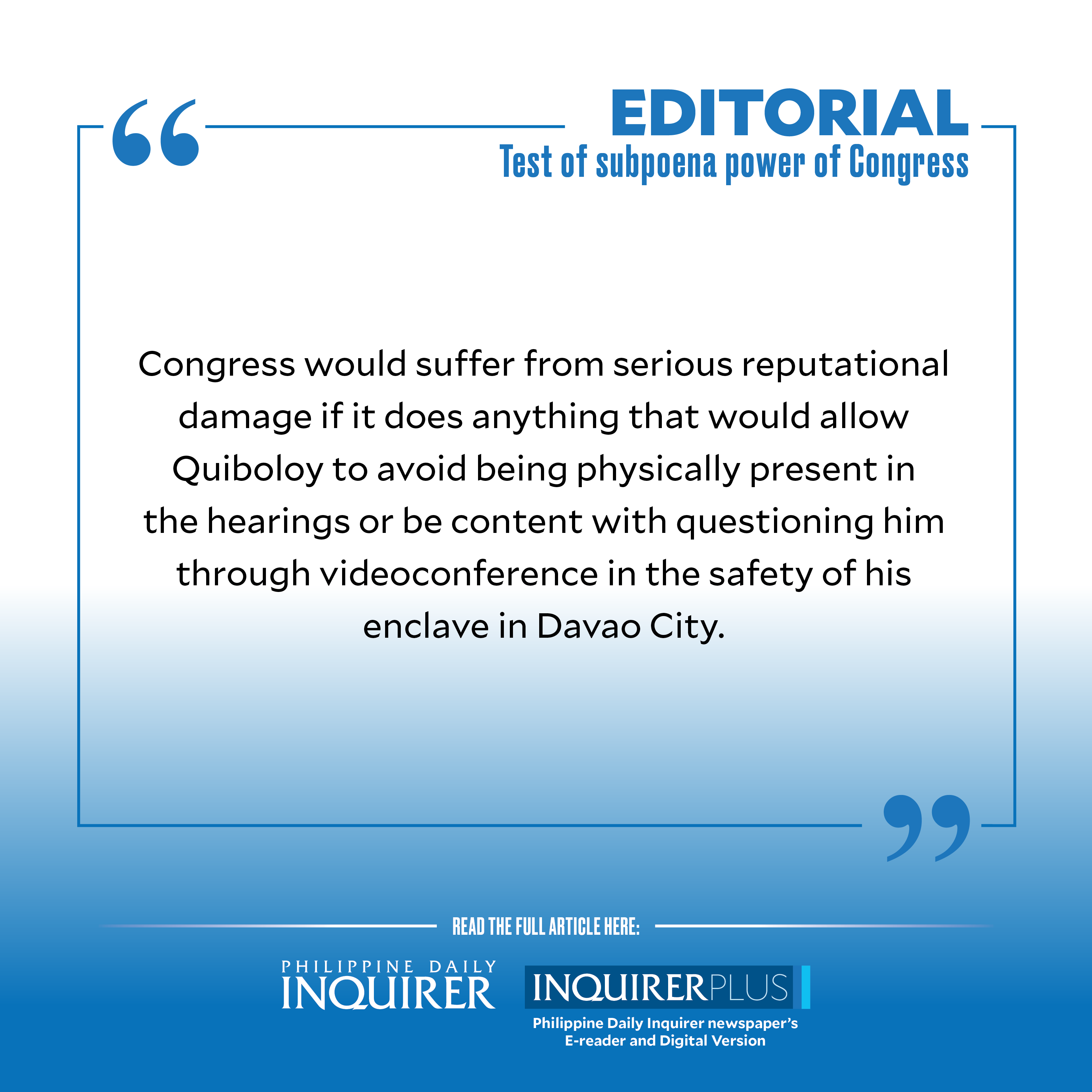Test of subpoena power of Congress

A test of wills looms between Congress and Kingdom of Jesus Christ founder and leader Apollo Quiboloy.
Speaker Martin Romualdez had issued a subpoena to Quiboloy to attend the hearing of the House committee on legislative franchises on alleged violations of the franchise of Sonshine Media Network International (SMNI), which operates a network of radio and television stations in the country.
Although Quiboloy’s lawyers had said that he is not involved in SMNI’s day-to-day operations, there are strong indications based on its past broadcasts that he is calling the shots in SMNI.
SMNI came under fire after one of its broadcasters erroneously claimed on air that Romualdez spent P1.8 billion on foreign travels in just one year.
Quiboloy’s refusal to attend the hearings despite several invitations, and merely sending his lawyers to represent him, prompted the House to invoke its power to compel attendance in its investigations.
Rape and forced labor
In the Senate, a subpoena had been issued by Senate President Juan Miguel Zubiri for Quiboloy to attend the hearing of a committee investigating reports of rape and forced labor he had allegedly committed on some of his former staff.
As was the case in the House, Quiboloy was a no-show in the committee’s hearing, forcing the Senate to order his compulsory attendance.
If Quiboloy ignores any of the subpoenas, or cites reasons for not honoring them that the House or the Senate thinks do not justify his nonattendance, he could be cited for contempt and ordered arrested and brought physically to the hearing.
In the past, when an arrest order was issued by Congress for refusal to comply with its summons, its enforcement was forcefully effected regardless of the political standing or influence of the concerned person.
Combative stance
Judging from the combative stance of Quiboloy’s lawyers in the hearings, there is a strong possibility they would file a petition in the Supreme Court to have those subpoenas quashed for being, say, excessive, abusive, or politically motivated.
It is doubtful, however, if the court would give due course to that petition because it would constitute an intrusion into the power of Congress to conduct investigations in aid of legislation, which is contrary to the principle of separation of powers between the three branches of government.
In the unlikely event the court rules in Quiboloy’s favor, it would not come as a surprise if Congress ignores it as it would represent a diminution of its legislative authority.
Earlier, the “appointed son of God,” as Quiboloy has described himself, had sent signals that he does not intend to get involved in the Senate investigation on the complaints against him.
He dared his accusers to file their complaints instead in court where he said he would have the opportunity to disprove the allegations against him.
Political clout
Quiboloy’s defiant stance is understandable. For decades, his endorsement was sought by politicians who believed the votes of his flock were critical to their election.
His political clout was at its peak during the Duterte administration. His financial and logistics contributions to the presidential campaign of the former president made him his fair-haired boy who got what he wanted inside and outside the political circle.
None of these subpoenas would have been issued, or even congressional hearings being called, in the past administration.
With the change in the political scene and his former benefactor no longer in power, Quiboloy has to face the reality that he can be held accountable for his past actions and that no less than Congress has undertaken to do that.
Public pressure
With the issuance of the subpoenas to Quiboloy, the two chambers of Congress are under public pressure to see to it that their orders are carried out to their letter.
If Quiboloy refuses to heed their summons, or demands certain conditions before he agrees to his attendance, the House and Senate leadership should immediately order his arrest and forcible appearance in the committee hearings.
Congress would suffer from serious reputational damage if it does anything that would allow Quiboloy to avoid being physically present in the hearings or be content with questioning him through videoconference in the safety of his enclave in Davao City.
There is also the possibility of Quiboloy citing medical or health reasons for his inability to personally attend the hearings, a ploy which had been successfully used by persons summoned by Congress from evading its subpoenas.
Remember the joke on who is the patron saint of people who are allergic to appearing before Congress? It’s St. Luke. Go figure.
It is reasonable to assume that Romualdez and Zubiri meant their orders to be strictly followed when they signed the subpoenas. Anything less than that would be unacceptable to the public.




















